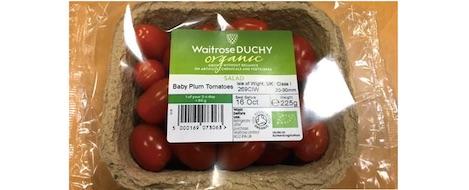
By Brian Collett — Waitrose, one of Britain’s largest supermarket chains, has taken another step towards its target of making all own-label packaging reusable or home-compostable by 2025.
The cardboard packaging of the 26 million sandwiches sold by Waitrose annually is now easily separated with a peelable tab from the plastic film, which is non-recyclable.
Even if customers bin the whole pack, recycling processors can separate the two parts.
Waitrose, part of the huge John Lewis department store firm, claims to be the first supermarket group to offer this environmental benefit.
Packaging manager Karen Graley said: “The change to our sandwich packaging may seem like a small one but it’s likely to make a big impact on the amount of packaging recycled.
“We continue to work on a solution to the pack’s plastic film in the hope that in the future none of the sandwich pack will go to landfill.”
The policy is seen as evidence that, despite the intensely competitive – some would say cut-throat – UK grocery marketplace, companies are nevertheless adopting ethical practices.
Waitrose says that, as well as cutting packaging waste, it is reducing carbon dioxide emissions and sourcing food responsibly.
It makes another claim, that it is the only supermarket group guaranteeing that all its fruit and vegetable growers meet the environmental and sustainability standards set by the industry organisation LEAF Marque.
At least four other household-name grocery chains have turned their attention to ethically responsible projects.
Tesco, the biggest, has its Bags of Help grant scheme, which has used sales of plastic carriers at 5p each to invest more than £30m ($39m, €33.6m) in community projects. The schemes include improving community buildings and outdoor spaces, buying new equipment and hosting events.
The projects are run in partnership with the Birmingham-based environmental NGO Groundwork.
Tesco has added to its effort this summer by introducing more durable 10p carriers, made from 94 per cent recyclable plastic, which are replaced free for customers if broken or damaged.
Marks & Spencer, the diversified groceries, clothes and home products store group, says its new sustainability Plan A 2025 will support 1,000 communities, help ten million people to live happier healthier lives and convert the company into a zero-waste business.
The aims are to make all packaging “widely recyclable”, raise £25m for cancer, heart disease, mental illness, loneliness and dementia charities, reward customers for making healthy food choices, and eliminate waste in its supply chain in addition to its own operations.
Chief executive Steve Rowe says: “We believe we can engage all of our 32 million customers, 85,000 colleagues and 200,000 shareholders in the plan that becomes a mass voice for sustainable change.”
The original Plan A achievements, claims the company, include making M&S the world’s first and only carbon-neutral big retailer and cutting carrier bag use by 80 per cent. Four billion fewer carrier bags have been handed out since 2008.
Morrisons says it continues to lead the market through its commitment to buying British meat. All Morrisons-branded fresh meat and milk is British, which means the policy minimises transport use and air pollution, besides benefiting businesses at home.
The company says: “At the core of the programme are our supply chain groups that help us to ensure that the work we do is fully focused on current practical issues affecting suppliers and their concerns for the future.
“The groups are comprised of farmers and processors and cover all species – beef, pork, lamb, chicken, eggs, cheese and milk.”
Through its charity programme, another of its CSR efforts, 2.3 million unsold items have been donated to community groups.
The J. Sainsbury commitment is to waste less and save more. The company says: “Sainsbury’s is on a mission to change the way we think about the food we buy, cook, eat – and throw away.”
It has produced recipes, videos and articles to help customers to hold down their food bills, including advice on using leftovers. As part of its programme it has earmarked £1m to invest in UK communities committed to tackling waste.
Are there signs that ethical policies are bringing business benefits? It may be significant that after a spell of financial troubles Tesco has posted a £562m pre-tax profit for the first half of 2017.
http://www.waitrose.com/content/waitrose/en/home/inspiration/about_waitrose/the_waitrose_way.html
https://www.tesco.com/carrier-bags/
http://corporate.marksandspencer.com/plan-a
https://www.morrisons-corporate.com/CR/?utm_source=groceries&utm_medium=internal&utm_campaign=footer_link
http://www.j-sainsbury.co.uk/about-us/live-well-for-less














